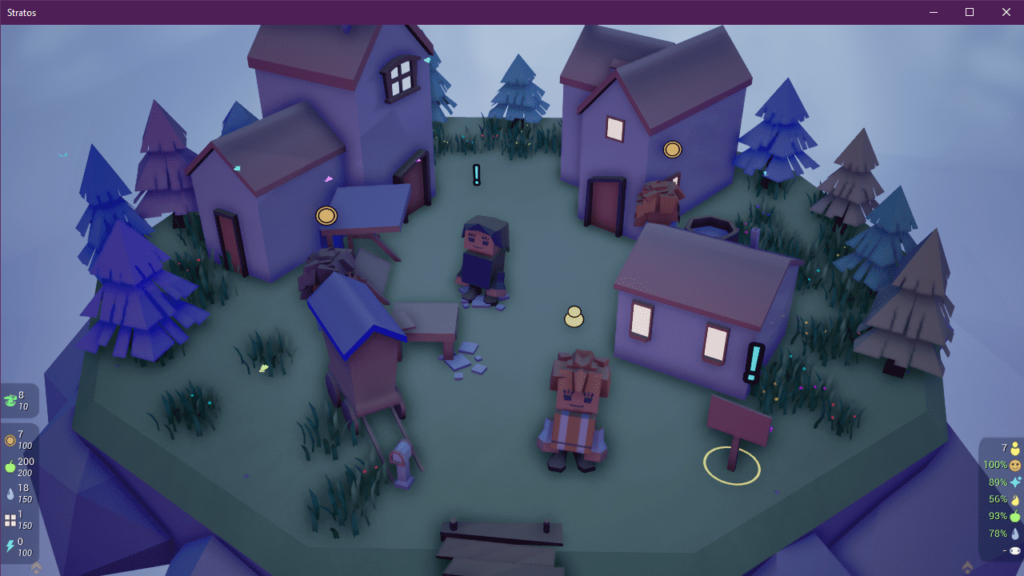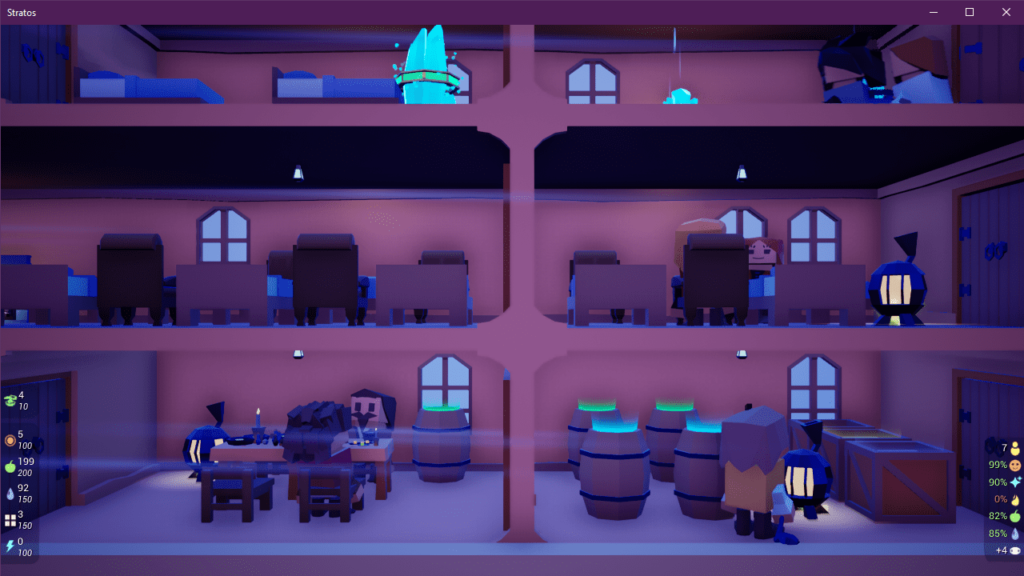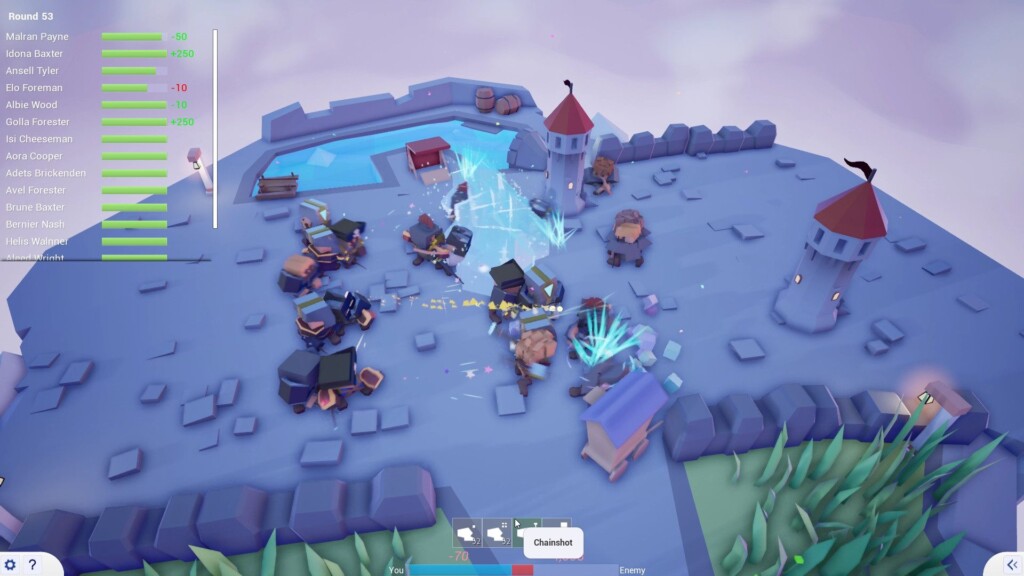Stratos was a nice surprise at a time when the world around us is burning to the ground, this being especially true for myself living out on the West Coast. I’m actually writing this review with Silent Hill happening right outside my window.
I’m the sort of person who really enjoy relaxing games. Look, I’m as big a fan of boomer shooters as the next old-timer but every now and then I like to game to relax and simply have a good time. Stratos fit that bill in a number of ways, from the charming look, the slow-paced gameplay, and pulling inspiration from games like Sim Tower, a game that is easily in my top 10 PC games of all time.
In fact, the relation to Sim Tower, or Yoot Tower if you’re nasty, is what grabbed my eye. The voxel graphics only added to the charm, the pirate theme being the last point that got my credit card out in a flash. Stratos, from single person development team New State, bills itself as a casual simulation game that takes place in the sky. And as someone who just finished streaming the entire series of Tale Spin on Disney+, this game felt tailored just for me. I’m still not entirely sure if New State has some sort of interface access into my sleeping thoughts.

As a video game, Stratos is broken up in five very simple parts all of which happen and work in tandem. It might sound like a lot, and it can be in the late game, but it’s really easy to grasp. The five parts include: Ship Building, Trading, Resource Management, Crew Management, and Combat. Those things should all be pretty easy to understand but let’s break them down a little bit for non-Sim (insert genre here).
Ship Building is your main focus of the game and you can think of it like the city in Sim City or the floors of your Tower in Sim/Yoot Tower. You start with a small ship and add rooms that each have their own attributes that help as you grow. You need bedrooms for your crew to sleep, kitchens to make food, gardens to grow food, bathrooms for cleanliness and so on. There aren’t a ton of them so it never gets overly complex. You can also think of the rooms like the attributes a Sim might have in the Sims. In fact, you crew act like little Sims in this regard, but I’ll get there in a minute.
Building is a breeze and I really appreciate the ability to expand a room even if there is already a room next door. You can extend the size of a room instead of building a new room on another level of the ship. Doing this will replace the room to the right, but it can make adjusting your ship easier. On top of rooms you will also need to populate them before they can be used. You can’t just build a bedroom as you’ll need to go into the editor and add a minimum number of objects. You may need two beds before a bedroom can be populated and adding more beds means more crew. The same for every room so simply buying the floor won’t do you any good. In many respects building and outfitting a ship feels like The Sims only without you in charge of the characters.
The next big part of the game, and where the real bit of tension comes from, is Resource Management. You need to collect resources like in something like Warcraft, adding another game I love into this melting pot of niceness. Since you are a sky pirate you will need to dock at a floating island which you select on the hex-tiled map. Each island contains something that you can make use of as well as some hazards. Finding a water island will let you fill up your tanks for drinking, food islands let you harvest food, and others contain a small mix of everything including various treasures.
Resource gathering is easy as pie. You simply click on a resource and your crew will head out and carry it back to your ship. The catch is that you need crew to do this and adding crew to your boat requires cash and space. And remember, if you build a room it probably requires a crew member to man and maintain. This in turn brings us onto Citizen Management. Here is where things can get tricky as finding the right balance is important, especially if you play the very basic singleplayer adventures the game provides.
While most people will simply play in “free play” mode that lets you do you, boo, there are options for games with win conditions much in the game they are in something like Roller Coaster Tycoon, another game in my top 10. Get out of my heart Stratos! Crew can be recruited at towns that you can dock at but you need to hire them and they will cost you depending on their stats. Crew can then be assigned to anything, but their stats make them better at certain tasks than others.

Just remember that you need the room before you can hire more crew and that the more crew means the faster resources deplete. On top of that, if you visit a town people may simply hop onboard if you have a large enough Tavern and Passenger Rooms for them to relax in until you hit the next port. These people will deplete you resources as well, but they will pay you for the travel so it’s some easy money. It’s really relaxing to see all your little dudes run about doing their own thing, but as your ship gets full the chances of crew slightly bugging out increases. Crew might glitch and randomly not eat and get made because they think you have no food when you do, or just bunch around storage bins that hold your resources. Hopefully, a patch or two can help clear these sorts of issues up.
Trading is where the accountant in you can nerd out. You can trade for resources and gear and this does become important when certain resource islands aren’t nearby and you are running short. It’s also a great way to make some cash selling off the treasures you collect along the way. It’s not my cup of tea and I’m sure every Master of Orion fan out there is going to rip me apart for it. I see it as a necessity but since Stratos is a chilled-out game this never gets super deep.
And lastly, and what makes it different from a traditional sim game, is the combat. Each crew member can be outfitted for combat which is need to take out mercenaries, baddies, and to capture islands from other factions that live in the game world. Remember, you are a pirate and doing someone dirty comes with the job from time to time. There is a simple RPG under the hood and Stratos makes it fun and simple to figure out. Trade and/or build gear that includes weapons and armor to outfit your selected crew members. Then, once you choose an encounter, you can engage in a combat mode.

Combat takes place first on a setup grid filled with various obstacles. You pick who you want to join the battle from your crew and then drop them onto the grid in any given pattern. I like my heavies up from with ranged dudes in the back and average troops in the middle. It’s super simple tactics as everyone just sort of smashes into each and the battle itself takes place on its own. You hit play and the two little armies will bash into each other and let loose the voxel dogs of war. If you survive you win, if you don’t, well, you know, you don’t.
It’s really fun and really simple. It’s nice to be able to lay out my warriors even if it doesn’t add that much strategy. But let’s say you survive an encounter. Some of your crew may die meaning they will need to be replaced, so losing a battle could have a huge impact on your ship if you are in the middle of nowhere. For those that survive, they may be injured and need to be healed or will not be happy and do poor work. So make sure you have a Medical Bay before starting to fight every Orc that walks by with an angry look on their face. It’s not instant either as they need a healing pot and the time to sleep off injuries. On top of this you can get into fights with other pirates and so cannons will need to be equipped on your ship just in case.
Stratos does a lot right but it isn’t a perfect experience. I’ve already touched on the crew glitches but there are more minor problems that are more annoying than anything. The game looks fantastic, but the interface feels really out of place. It doesn’t integrate visually very well which is disappointing. It feels very medical and almost pulled from other titles altogether. It’s super clean and simple but lacks the same sort of joyful look the game pushes. The game also feels fairly empty at times which I chalk up to the fact that it’s up in the sky. I just wish there was more going on around your ship most of the time. The sound and music is quite nice but often cuts out suddenly and at random. And I’d be lying if I didn’t mention that I hate how crafted items won’t pop up a finished alert making management a pain.

Menus need some work
Look, I really do love the relaxed nature of the game but it does at times feel a bit unfinished around the edges. There just feels like there should be more for you and your little dudes to do. Different sorts of encounters, more quest lines, and world events that randomly impact your ship to keep you on your toes a bit. Stratos feels like a title just out of Early Access and still needs a little more time in the oven to add some depth and replayability. That said, it is a title created by a single person and the game is only $10 and I can just about recommended it for that price, especially since the developer does seem to be active and asking for suggestions for future patches.
Still, most of the above issues are minor and Stratos does do a great job at what it sets out to do. It’s really relaxing and you can take your time with the experience and equally push it into some sort of massive mayhem of bodies and tasks. If you want a relaxing building game then pull the trigger on this one and cross your fingers for future updates.
“Stratos is a charming and relaxing simulation game where you can build your perfect pirate paradise in the sky”

